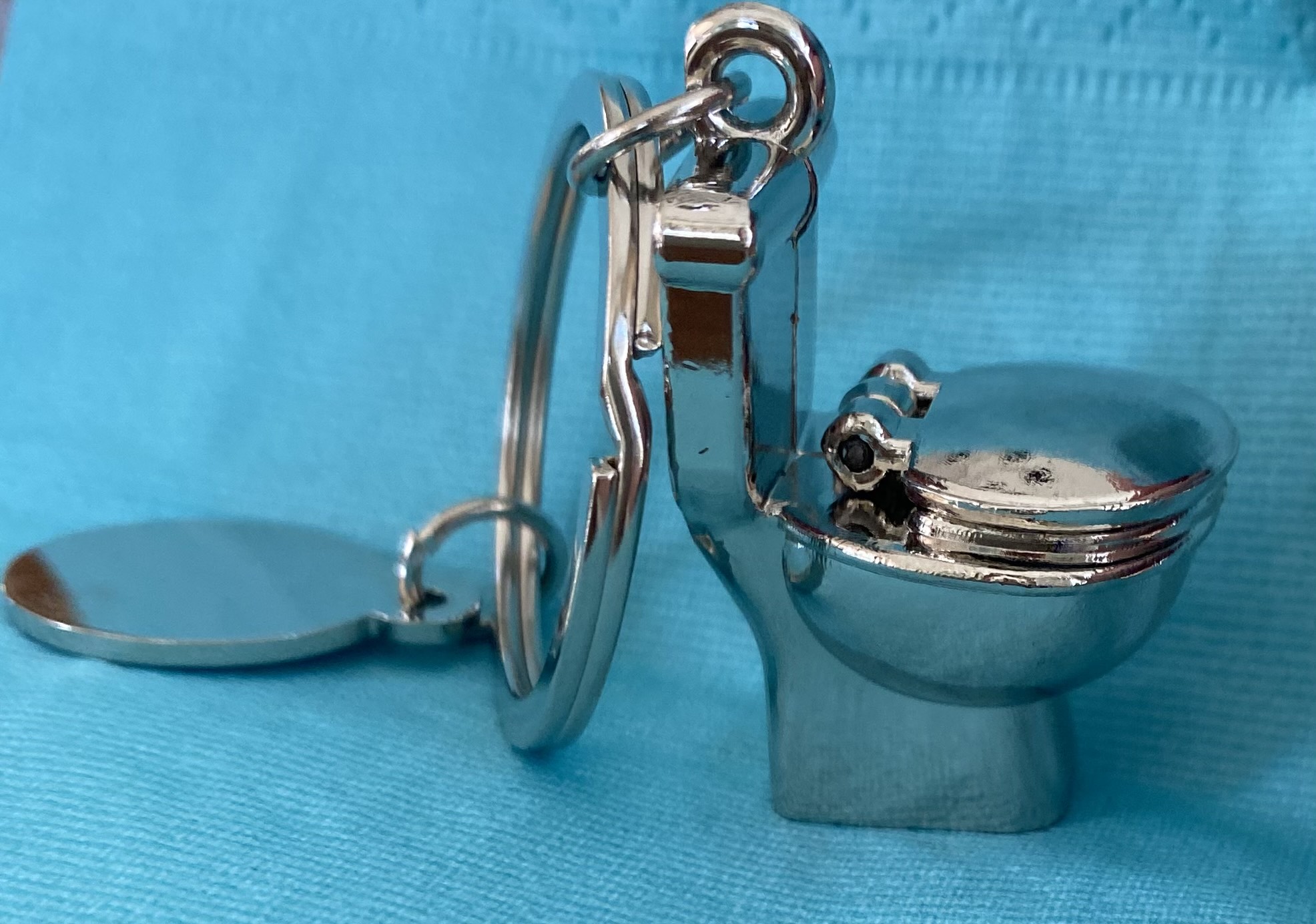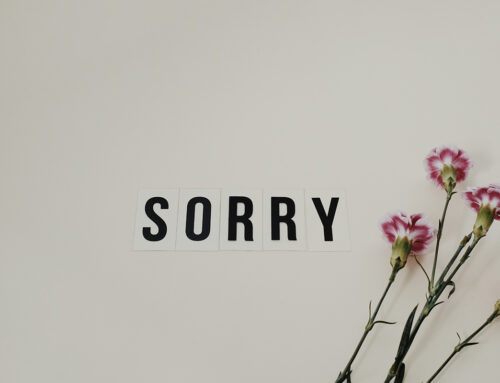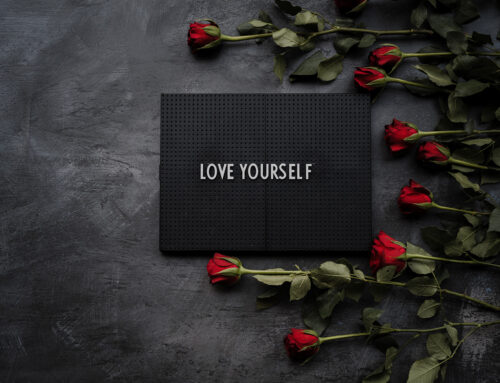Although I am a licensed psychotherapist in private practice, dealing primarily with people with trauma, my journalist/English teacher background bubbles up organically as I craft analogies or images to illustrate what I want to be powerful reminders clients won’t easily forget.
For example, when I was a teacher, I always used popular music to teach literary and poetry devices. Bottomline, most students hate poetry because they haven’t been taught how to crack the code of figurative language. But music makes it easy to illustrate metaphors (You’re my blue sky; you’re my sunny day) and similes (Like a virgin) and onomatopoeia (You’ve got that boom, boom, pow.). I want it to be that way for life lessons: easy to remember and understand, with symbols or images that are unforgettable.
Here’s one of my favs:
Don’t lick the toilet.
Eh. I mean, yuck, who would? That’s a vile image, agreed? (I initially wrote it was pretty vile, which is an oxymoron two opposite words put together)
The vileness is intentional. The revulsion created by the mere thought of treating a toilet like a popsicle, even an unused, pristine model on the floor of a hardware store, with the most tentative lick, is intentionally horrible.
We wouldn’t do it. Well, we might if there was a large sum of money or fabulous reward involved, but that’s another chapter.
In life, we encounter cess pools in disguise all the time. Like all cess pools, they are full of and spew vile, awful, stinky, sickening stuff and we belly right up and drink it down. We go back over and over, lapping it up like the toilet is the source of all life, a refreshing spring.
And we wonder why we feel terrible, sickened by the thought of drinking from the toilet again and again. And yet we go back, expecting a different experience, a different taste.
Granted, the toxic vessels in our lives are disguised in the most pleasant of ways. We ignore how we feel when we’re around them, when we think about drinking up what they offer. We tell ourselves how good it is and marvel when we resist them or get sick every time we go in for a sip.
Now, don’t get me wrong, I fully embrace the Christian belief that people bear the image of God, our Creator. But too often, the light of God, however it might manifest in us, is often covered in dysfunctional goo. And despite abundant evidence of that goo, we just keep licking it up, telling ourselves that the cess pool is the most delicious source of sustenance.
In part, this is because we all write stories in our heads and hearts about how our lives and relationships should look, often ignoring reality in pursuit of this fairy tale ideal that often has no resemblance to actual living. Sometimes these stories are written generationally, as we are passed down beliefs that family is invaluable, enduring and that we must tolerate all forms of abuse and crap to protect it and keep it intact. For survival, the family as community had value and aided in survival.
I may be a heretic, but I have a sign gifted by a non-blood sister that says, “Friends are the family you choose.”
That sentiment is often rejected outright, despite evidence to the contrary.
When it comes to people, we think in terms of personal pronouns and responsibility, I should…, I need to …, I must …, particularly about our role in the social intercourse of family, especially, but also friendships, romantic partnerships, work interactions, etc.
We often ignore or rewrite painful real-life happenings and create idyllic interactions in our daydreams, plans, and even memories, rewriting what actually occurred with rose-colored replacements that are fashioned by us or others. Or we blame ourselves. I didn’t try hard enough, I didn’t give enough, I, I, I, I, I.
Psychotherapy defines the twisting of reality as a cognitive distortion, regardless of who writes it, either ourselves or someone else, or both.
In our lives, these distortions feel like recurring bruises we get from bumping into the sharp-cornered tables of life.
My focus on the repetitiveness of these injuries to our psyche, our very beings, came into the sharp focus with a client I’ll call Tee.
Thirty-two year-old Tee came to me to resolve her ornery interactions with an extended tribe of in-laws. She – and they – placed all blame for the unpleasantness on her. She didn’t visit enough, she kept their son/brother from them, she didn’t pay enough attention to her sister-in-law’s new baby, she didn’t adequately or outwardly celebrate her baby’s presence in Jesus’ arms. I kid you not.
She bore the guilt, pain and scapegoating silently, with the exception of fat tears that ran down hollow cheeks every week. She was so convinced of her own failings that she couldn’t even allow herself to cry freely because what did she have to cry about?
Her back story, as a sheltered Mid-Western girl from a homeschooling, Christian family, included the recent late-term still birth of her baby boy, the recent death of her only sister to cancer, anorexia born in a perfectionistic past as an amateur gymnast and invisible steamer trunks of inadequacy born in her doctor husband’s infidelities, porn addiction and his family’s constant litany of complaints posted against her.
As Tee saw it, she was so desperately inadequate, broken beyond repair, that she had no choice but to continue licking the toilet. As a psychotherapist, most of my clients have this in common and I’ve been guilty of it myself in varying degrees throughout my life.
The dread of an upcoming visit to the in-laws for Thanksgiving was the topic of one session. The last Christmas, Tee found herself backed into the corner of a tiny bathroom by her sister-in-law and then later herded into a car, where she was harangued by her mother-in-law and the same sister-in-law about her inadequacies until they decided to bring her back, battered emotionally and exhausted. In reality, she was traumatized – held against her will and bludgeoned with accusations and venomous criticism, with no thought to her own losses, pain and damage.
They told her she was difficult. She didn’t talk enough. She didn’t have a good enough time. She needed to forget her baby and her sister focus on living and her neonate nephew. She didn’t, she wasn’t, she needed to … on and on, ad infinitum.
Her father-in-law, a minister, smiled and nodded approvingly when the women entered the house.
Clinically, we would describe Tee’s role in this family as the scapegoat and the overall phenomenon as Family Scapegoating Abuse. Conveniently, they could overlook their youngest son’s financial dependence on them and his heroin addition, if they hyperfocused on Tee and her trumped up failings. They could overlook their son’s and Tee’s husband’s infidelities, by focusing on the still birth of their child, which demonstrated yet additional evidence of Tee’s flaws and inadequacies and their disgust for her.
So much for Christian love and charity.
That’s where the toilet comes in.
“Would you lick the toilet?” I asked Tee.
She looked up from where she’d been staring at her clasped hands.
“Excuse me, what?” she said incredulously.
“I said, would you lick the toilet?”
“Um, no. Ew. What do you mean?”
“I mean would you lick the toilet?”
“No,” she said.
Then, why, when they have demonstrated to you, that they are full of crap, would you continue to expose yourself to the toxic garbage they are filled with and apparently enjoy spewing all over you, every time you visit?”
She was silent.
But they’re my family.
“Ok, so you’re going to lick the toilet?”
She was silent and sat for a few minutes with a frown on her face.
“But what else can I do? They’re my family. My in-laws. My husband’s







